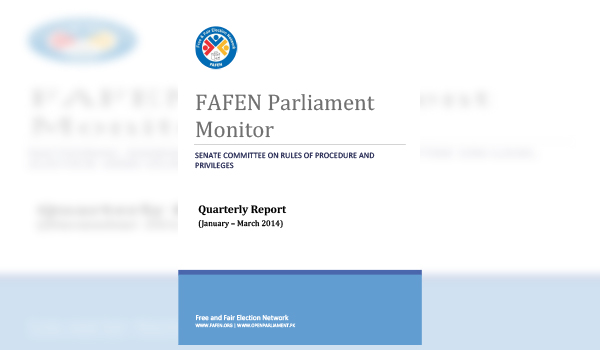Executive Summary
The Senate Committee on Rules and Privileges looked into several motions based on senators’ grievances, however it faced some internal as well as external challenges in the efficient disposal of its agenda such as noncompliance of relevant authorities, committee’s slack in seeking follow ups and low attendance of its members, Says Free and Fair Elections network in its report based on direct observation of the Senate Standing Committees.
The Committee tasked to consider matters regarding the procedures and conduct of business in the House and disposal of privilege motions moved by Senators, constitutes proportional members of political parties based on their strength in the Senate. The largest party in the House, PPPP, has four members, followed by PML-N (three members, including the ex-officio member), ANP and independent members (two members each) and a single member of MQM, PML, PKMAP and PML-F.
Over the reporting period starting from January till March, 2014 the committee was called in four meetings consuming a little more than seven hours. On average, each meeting lasted an hour and 24 minutes while remaining 10 minutes behind schedule.
The lack of interest in the committee proceedings on part of the committee members is reflected in their low attendance as, on average, three members were sighted at the beginning and four at the adjournment of a meeting. According to committee rules the quorum meets on the presence of one fourth committee members (four out of total 16) however, a lack of quorum was witnessed at the beginning of all sittings while it never met in the fourth sitting.
Overall nine of 16 committee members (56%) participated variably in the meetings. Only one of the PPPP committee members participated while two members each of PML-N and ANP, and a single member each of Independent members, MQM, PML and PKMAP also contributed to the deliberations. However two members belonging to PPPP, including the sitting Leader of the Opposition in Senate, and a single member each of PML-N and PML-F did not appear in any committee meetings.
The Committee agenda was relevant and primarily based on motions moved over breach of privileges of Senate, Parliamentarians over the failure of government bodies to reply or provide accurate answers to questions put up by Senators, entertain their requests, and ensure their security and privacy.
Another issue faced by the committee in the effective perusal of its agenda was the lack of interest demonstrated by senior government officials to respond to the committee invitations and calls for documents. On many occasions the focal person invited did not appear at all or was represented by his second in command with inadequate supporting documents which in turn marred the committee’s performance. The Additional Secretary Aviation division filled in for the Secretary Aviation Division and Managing Director PIA while providing an unsatisfactory reply to the committee during the meeting held on February 20. Similarly, neither the Interior Minister nor Secretary interior paid heed to the committee call to appear in the March 14 committee meeting sending the Additional Secretary for Interior instead, with an outdated inquiry report instead of a fresh one, as sought by the committee.
A slack on the part of the committee in terms of perusal of agenda and follow ups on committee recommendations and directives was also observed. One example could be the case of a motion moved by an ANP senator over the failure of the Ministry of Petroleum to reply to his question. After deliberating on the issue the committee directed the Secretary Petroleum and Natural resources to provide a list of PSO employees promoted in 2012-13, within a month, for further investigation into the matter. However, the matter was never taken up in any of the subsequent meetings during the quarter.
Functions of the Senate Committee on Rules
The Standing Committee on Rules and Procedures performs the function of considering matters of procedure and conduct of business in the Senate and recommend amendments to the rules as it may view necessary.
Additionally the Committee is also required to examine all questions of privilege referred to it by the Upper House or the Chairman and ascertain whether a violation of privilege is involved and, if so, the nature of the violation and the circumstances leading to it and make necessary recommendations. The committee can also suggest the procedures to be followed by the House to give effect to its recommendations.
As per Rule 70 of the Senate Rules of procedures a member may, with the consent of the Chairman, raise a question involving a breach of privilege either of a member or of the member or the House or its Committee. A privilege motion can be based on several matters requiring the intervention of the Senate including misconduct in the presence of House or a Committees; presenting forged or fabricated documents to the House or its Committees; premature publication of proceedings, evidence or report of a Parliamentary Committee; derogatory reflection on the report of a Parliamentary Committee; obstructing members in the discharge of their duties.
Members can also move privilege motions on refusal of a government functionary to assist officers of the House when called upon to do so in pursuance of the orders of the House or a Committee thereof as the case may be; failure of the government to lay before the House any report or a document required to be laid before the House in pursuance of the provisions of the Constitution or the law etc.
If the Chairman holds the question of privilege to be in order, it shall stand referred to the Committee on Rules of Procedure and Privileges for examination, investigation and report, unless the Senate decides to consider the question itself.
For complete report click here









